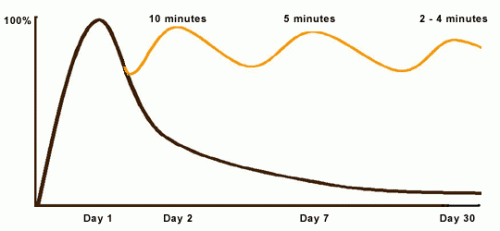
Be limitless.
Memory retentionis a critical aspect of yourlearning process. Research after research shows that, without active engagement,about 50% of new information can be lost within an hour, escalating to 70% after a day and up to 90% after a week.

The curve of forgetting.
To combat this, here are scientifically-backed strategies to enhance memory retention:
Use Visual Aids
Our brains naturally process visual and textual information combined more efficiently than just text alone. Includingdiagrams,charts, andimagesas visual aids can assist in encoding learning experiences into long-term memory.
This approach capitalizes on the brain’s inclination to process data, making it easier to recall the information.
Embrace Pen and Paper
Even in this era where everything is digitized, there are distinct advantages to writing by hand. Engaging areas of the brain compared to typing and writing by hand can contribute to forming memory traces. The tactile experience of putting pen to paper can lead to retention of information.
Seek Demonstrations and Engage in Group Discussions
Participation in learning through demonstrations and group discussions can significantly enhance understanding and memory retention. These activities promote engagement with the subject matter, making it more memorable.
Share What You Know
Explaining concepts to others reinforces your understanding and helps identify gaps in your knowledge. Teaching is a method of processing information at a level that improves memory retention.
Learning by teaching is my favorite; for me, it works %100 of the time. When I explain something, I learn from the process of explanation and the often unexpected questions the audience asks. It challenges the gaps in my knowledge.
To enhance the understanding of the concept that explaining concepts to others can reinforce one’s understanding and help identify knowledge gaps, it is beneficial to link this idea to the Feynman Technique. **The Feynman Technique **, named after the renowned physicist Richard Feynman, is a method of learning that emphasizes teaching a concept in simple terms to improve understanding and memory retention. This technique involves four key steps:
- Choose a Concept: First, select a concept or topic you want to understand better, just as you would when preparing to explain something to others.
- Teach it to a Child: Then, explain this concept as if you were teaching it to someone with no background in the area, such as a child. This forces you to simplify the language and break down the concept into its most fundamental elements, similar to when you articulate ideas to others to enhance your grasp of the subject.
- Identify Gaps and Go Back to the Source Material: As you attempt to explain, you’ll likely encounter areas where your understanding is lacking. This step mirrors the process of identifying gaps in your knowledge when you explain concepts to others. You then return to your source materials to fill in these gaps.
- Review and Simplify: Review your explanation and refine it, making it as simple as possible. This step ensures that you’ve not only understood the concept yourself but that you’re also able to convey it effectively to others, thereby reinforcing your learning.
Connect New Material with Existing Knowledge
Establishing connections between information and what you know creates a knowledge network that facilitates retrieval. The more “unusual” these connections are, the better it will stick.
Actively Retrieve Information from Memory
Instead of passively reading information, try to recall it from memory. This active retrieval strengthens your memory. Improves long-term retention. It makes the information more durable and easier to access.
Read Aloud
Reading aloud engages both your auditory senses, enhancing memory retention. This multi-sensory approach stimulates various brain areas, making learning more effective.
Embrace Your Mistakes
Learning from mistakes that are close to the correct answer can be highly beneficial. These “educated errors” offer an opportunity to refine and deepen your understanding, solidifying the information in your memory.
Conclusion
Incorporating these strategies into your learning process can significantly enhance your ability to retain and recall information. Each method utilizes functions resulting in more effective and long-lasting memory retention.
References and Further Reading
- Richard Feynman
- The Testing Effect
- Curve of Forgetting
- Using Retrieval Practice to Promote Long-Term Retention
- Feynman Technique: A Complete Beginner’s Guide
- How Mistakes Can Make You Smarter
- It’s Better to Make Mistakes While Learning
- The influence of prior knowledge on memory: a developmental cognitive neuroscience perspective
- Expecting to teach enhances learning and organization of knowledge in free recall of text passages
- Small group discussion: Students perspectives
- Study shows stronger brain activity after writing on paper than on tablet or smartphone
- Reading Information Aloud to Yourself Improves Memory
- Reading information aloud to yourself improves memory of materials
Section Contents
▶ Unlock Your Brain’s Power: Learn Fast, Remember More